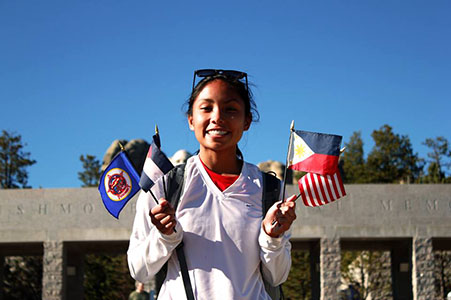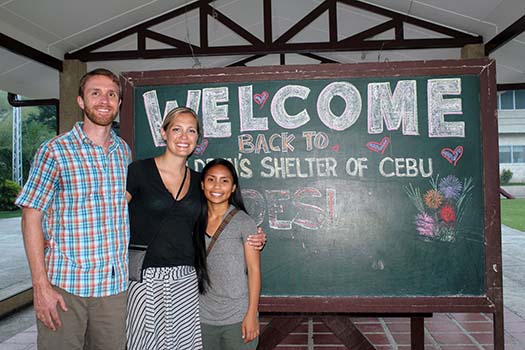Researching Attachment: A Student’s Journey to Her Orphanage in the Philippines

Desiree (Desi) Hartman was adopted from the Philippines’ Children’s Shelter of Cebu (CSC) by a Minnesota family shortly after her first birthday. At age 22, Desi spent five weeks at CSC researching attachment theory in a multiple caregiver setting for her thesis project as a psychology major at Colorado College. I was able to spend some time with Desi as she graciously and passionately discussed her experience returning to her orphanage in the Philippines and her personal calling to help put children and families first.
Desi, like many adoptees, felt more than just a simple curiosity in high school during psychology class as she learned about the concept of nature vs. nurture. “When that topic popped up, it brought up a lot for me around identity and upbringing. It got me thinking about my adoption story more.” Throughout high school and college, Desi started to realize “how anxious I would get around my relationships, whether with family members, friends or significant others.” In college, Desi learned about “toxic stress” in a class called Sociology of Health and Medicine. She explained, “When you are a baby and experiencing things in your overwhelming new world – loud noises, hunger, teeth ripping through your gums, strangers, etc – your stress level is elevated. You don’t know yet how to cope and bring it down – that’s where caregivers come in. Caregivers respond to an infant’s needs and help calm down the baby’s nervous system. Research shows that when babies don’t have responsive caregivers and are exposed to toxic stress over long periods of time, or Adverse Childhood Experiences (ACEs), it can impact the child’s mental health later on in life.” Desi became drawn to learning more about the critical role of caregivers for children in their earliest years of life and also wondered how her own early years as an adoptee from an orphanage were impacted.

Desi and her cousins at CSC in the Philippines
As a psychology major at Colorado College, Desi was required to complete a thesis project on a research topic of her choosing. Questions around early attachment intrigued Desi on a personal, professional, and educational level: What were my early years like? What was the orphanage like? How can I use this thesis to explore caregiving and attachment in orphanages in early life? She saw her thesis project as a major opportunity to explore these questions around early attachment for herself and her greater career interests. After she reached out to CSC, they responded openly and warmly, inviting Desi to come visit and conduct her research.
Desi spent five weeks living at the Children’s Shelter of Cebu, a Christian orphanage funded by individuals in the US. She studied early attachment between the caregivers, who are called “aunties,” and the infants and toddlers. Desi’s findings, through both her literature review and research observations at the orphanage, include the following:
- Small ratios (3:1 child to caregiver), staff stability, and routine shifts supported healthy attachment development. This allowed caregivers to be sensitive and responsive to children. And children responded well to consistent caretakers, structure and reliability.
- In a multiple caregiver setting, some children develop an adaptive strategy. Desi found, through both her literature review and her observational research at CSC, that some children exhibited “indiscriminate attachment behavior.” This is characterized as affectionate and friendly behavior towards all adults without fear or caution towards strangers. Desi found research that suggested this could be an adaptive strategy for children in multiple caregiving settings where friendly children receive more attention than shy children.
New questions unrelated to her research also unexpectedly arose from Desi’s observations:
- If caregivers develop “favorites,” do those connections come at the cost of attachment to other children? Desi learned through conversations with the aunties that they struggled with having “favorites”. Desi perceived that “favorites” were children that caregivers unintentionally had natural, closer connections with. This led Desi to further question if the favorite child developed a secure attachment but at the cost of another child. At the Cebu orphanage, the aunties spent time paying attention to this issue and tried hard to avoid this problem by developing relationships equally with all children. This compassionate and mindful attitude was Desi’s favorite “finding” of her thesis experience.
Despite the warmth and mindful attitudes in this orphanage, Desi’s research and literature review found that “care received in orphanages is just not the same as coming from a two-caregiver home, even though my orphanage had really quality care. This is something that I am still grappling with more than anything.” Desi said that returning to the orphanage as an adult was a critical piece in helping her to “own my story”. As Desi spent her first year at CSC, she said, “it was meaningful to see that it was a portion of my life that was better than I thought.” Desi reflected on the compassion she witnessed: “The aunties would say, ‘We love our children, so they can go on and love their forever family,’ and for me it was really powerful and meaningful. I felt privileged to come from this orphanage. I received incredible care there”.
Desi approached returning and doing research at her orphanage with an open mind – she didn’t want to have unrealistic expectations and acknowledged that there could be emotionally difficult moments. “I was lucky that there were a lot of positive emotions. The hardest thing for me was learning about the situations the children had come from” – situations of violence, abuse, rape, and incest, being born to parents with disabilities, and being a child with a disability. “You have zero control over the situation you’re born into.” Desi also spoke about her experience being a “playmate” for the children. One day, she was unable to play with one of the children. She was struck by how sad it made the child and how what seemed like a small interaction was actually a big deal and hurt the child’s feelings. It took time for Desi to earn the child’s trust back by consistently being present and attentive to the child’s needs. A few days later, the child was eagerly asking to play again. “This was a powerful reminder of how important relationships with caregivers are and how easily trust can be broken with kids who have faced adversity and not experienced great attachments.”
As Desi found herself experiencing both empathy and compassion for the children, she also found herself in some emotional pain as she witnessed their pain. In order to take care of herself mentally and emotionally, Desi intentionally spent a lot of time just playing with the children and also journaling every night, processing the ups and downs of the experience.
Desi also shared, “This experience wouldn’t have been possible without the love, support and encouragement of my family, friends, Tricia Waters (thesis advisor), Lindsay Hoeft (field advisor), CSC, and many others. I am extremely grateful for my army of support and for the growth I’ve experienced during and after my thesis project trip to CSC. And thank you to BPAR for being interested in learning more and sharing my story.”
Several years later, Desi continues in her ever-growing determination to help put “children and families first.” She shared, “The field of interest to me is early childhood development. I have become more interested in bringing early attachment into my work with families.” She has come to understand that her birth family’s inability to “care for me was the result of a community and country failing to put children and families first.” Her goals are to “strengthen, build and in many ways redesign communities to do just that – to put children and families first.” Desi believes this work takes cross-sector and multidisciplinary approaches and is still deciding whether to pursue her dreams through social work, public health or child development. Wherever the road may take her, it is clear that with Desi’s passion and her strong sense of empathy, she will contribute great things to this field.
Additional Note: A very common question people ask Desi after learning about her research and journey to the Philippines is, “Did you think about trying to see your birth family while you were there?” For this article, Desi chose not to share specifics on whether she did or did not try to see her birth family while in the Philippines because she finds it important to choose very intentionally who she shares this story with. She feels that in our culture the “meeting of birth family” can be sensationalized and made into a magical experience when “the thoughts, feelings, process, and actions around an adoptee and their relationship with their birth family is a real, complicated life journey.”
Lisa Coppola, LMHC, Boston Post Adoption Resources